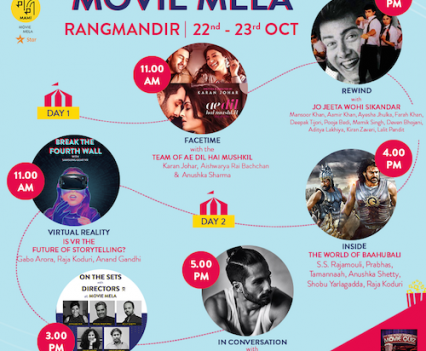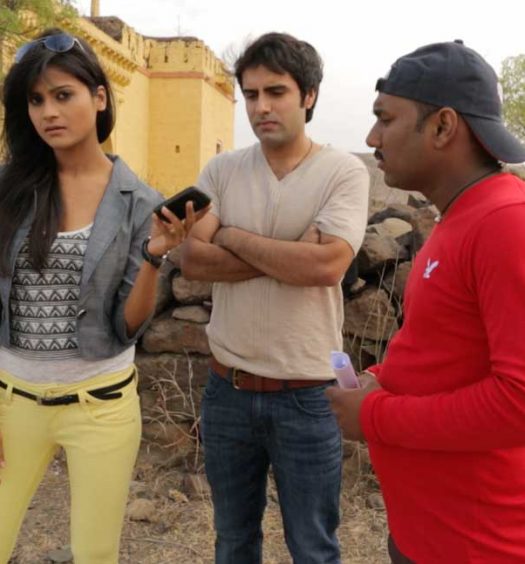MAMI Wrap Up – Day 3
[pdf-embedder url=”https://filmcity.one/wp-content/uploads/2016/10/Issue-03_Upload.pdf” title=”The Dailies 3″]
Movies, Music, Memories!
The festival mania rolls on as another new day dawns at MAMI. But first, a look at last evening’s major newsmakers.
A room full of eager fans were held rapt at The Masterclass with Chinese filmmaking stalwart Jia Zhangke (See Page 4). Let’s hope that getting to know Zhangke and his oeuvre better will fuel greater interest in his cinema across the country.
Later, Konkona Sensharma’s A Death in the Gunj set MAMI abuzz. If the reception is anything to go by, Sensharma has a self-assured directorial success on her hands.
The Dailies’ big interview of the day features Polish filmmaker Tomasz Wasilewski (See Page 2). Wasilewski discusses his past and future projects and being fascinated by broken characters. There are some talked about entries for the ‘India Gold’ section on today’s roster, so be sure to catch them.
Fans in a nostalgic mood can look forward to a panel on the 1960s hit Teesri Manzil where Aamir Khan will join other guests to discuss the film’s enduring legacy.
Also showing, Dziga Vertov’s all-time classic Man With A Movie Camera, considered compulsory viewing by serious film buffs everywhere. The screening will be accompanied by live music from the Vitaliy Tkachuk Quartet. In short, a day full of music, memories and of course, movies lies ahead. Enjoy!
The Little Prince – Half Ticket Opening Film
Rediscover one of the most beloved stories of all time. From Academy Award nominated director Mark Osborne, comes the first ever animated feature film adaptation of Antoine de Saint-de Saint-Exupéry’s iconic masterpiece, The Little Prince.

The Little Prince
At the heart of it all is a little girl, who’s being prepared by her mother for the very grown-up world in which they live. But this little girl is soon distracted by her strange and ancient neighbor, the Aviator, who introduces her to an extraordinary world where anything is possible! It’s here that the little girl’s magical and emotional journey into her own imagination – and into the universe of The Little Prince – begins. And it’s where she rediscovers her childhood and learns that ultimately, it’s human connections that matter most.
Q & A Excerpts – Dog Days

Q & A with Dog Days Director Jordan Schiele
Jordan Schiele’s stirring and contemplative drama Dog Days talks about confrontations and tests a single unmarried mother Lulu, who works as a dancer in a shoddy night club and what she encounters while searching for her missing baby in contemporary China.
The film’s story stemmed from a tragic accident that Schiele witnessed in Beijing when a young woman riding a bicycle with her child was knocked down by a vehicle and only she survived that fateful day. Newspaper articles and his experiences in China added incidences to the drama.
The film was shot in real locations in Southern China and Shanghai. On asked about the challenges he faced while making the small budget indie film, the director shared how working in real locations was difficult but dealing with censorship was more amusing.
“The main challenge was censorship and people advised me to not shoot what I intended to as it would be censored. But let me tell all filmmakers here to not get disheartened and not listen to all voices ‘speaking for your betterment’. Do what you need to do to make the film. Yes, I had shot a lot, which was edited but I was amazed that a lot was allowed to be kept as it is. They gave me feedback as I worked around it. We filmmakers have to find a way to express our voice.”
Excerpts from the Jia Zhangke Masterclass

As Chaitanya Tamhane put it so aptly, these are the kind of inspiring conversations that we love being a part of at film festivals. Chinese director Jia Zhangke and Chaitanya Tamhane, director of the acclaimed Marathi film ‘Court’, engaged in a back and forth that was as thought-provoking as it was riveting.
Treading fearlessly into issues including one’s roots, identity, poverty, censorship and films as a means of expression, the conversation provided an intimate portrayal of Jia’s ethos and the elements that drive his filmmaking. One thing’s for certain: the more you learn about this soft-spoken, unassuming man and his travails, the more your respect for him grows.
One of the most interesting things that Chaitanya Tamhane asked Jia was, “You’ve faced so much resistance to your movies in China, where A Touch of Sin has been denied a release permit, and a slew of other issues including distribution. It’s amazing that you have not become cynical or bitter. How have you kept yourself motivated?”
Jia waxed poetic, comparing making a film to having a child. “It gives you a sense of beauty, hope and inspiration, and is ultimately very rewarding. There’s a magic when something comes to life, and that gives me a lot of strength to carry on. Regarding censorship, a creator should never sacrifice his artistic vision.”
Jia also remarked that there were changes happening in China, when it came to censorship in film. The various dialects in China are a big part of one’s identity and sense of home. In his debut feature Xiao Wu, Jia had only non professional actors in the last scene, in which they were speaking in their own dialects. The censorship bureau pulled them up for not speaking the widely-spoken, standardised Mandarin language, but after much coaxing from Jia, and explanations as to the significance of these dialects, they finally relented. “It is a process that took many years, but you can’t be passive and self-sacrificing,” he said. “I’ve resisted for many years and have finally seen changes in recent times.”
As for the future of art house films from Asia, in an age when everything is market-driven, he answered with a question of his own that cracked the audience up, “Why do we want to make independent films so badly, when they’re so hard to make?
“There are so many problems in our lives, and these societal problems are rampant all over the world. No matter what the situation is, this need to express these issues that we’re experiencing is essential. Indie films will always find a way to be made, because they have to be made.”









